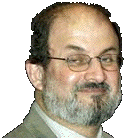June 19: Salman Rushdie (1947)
 It was on this date, June 19, 1947, that novelist Salman Rushdie was born Ahmed Salman Rushdie in Bombay, India. Rushdie was born into a Muslim family of Kashmiri descent and the family name was chosen by Salman’s father as a tribute to Islamic scholar Averroes or Ibn Rushd. He was educated in Mumbai and Rugby School, then in England, where Rushdie read history at King's College, University of Cambridge. It was while working as a copywriter for a British ad agency that Rushdie’s second novel, Midnight's Children, won him the Booker Prize in 1981 and set him on his path as a full-time writer.
It was on this date, June 19, 1947, that novelist Salman Rushdie was born Ahmed Salman Rushdie in Bombay, India. Rushdie was born into a Muslim family of Kashmiri descent and the family name was chosen by Salman’s father as a tribute to Islamic scholar Averroes or Ibn Rushd. He was educated in Mumbai and Rugby School, then in England, where Rushdie read history at King's College, University of Cambridge. It was while working as a copywriter for a British ad agency that Rushdie’s second novel, Midnight's Children, won him the Booker Prize in 1981 and set him on his path as a full-time writer.
But on 14 February 1988 his book The Satanic Verses earned him a fatwā or decision from Iran’s Ayatollah Khomeini, who proclaimed the book “blasphemous against Islam”—blasphemy being a charge hurled by clerics to prevent them from having to offer a counter-argument. The cleric proclaimed a reward for any Muslim who killed Rushdie—as the delicate feelings of all-powerful Allah had been hurt. The book was banned in a dozen Muslim-dominated countries and book-burnings and rallies were held in several Western countries. Because death threats were made against him, Rushdie was forced to live under police protection for several years. In a 6 February 1990 lecture, the year after Khomeini died, Rushdie said of the fatwā, “The idea of the sacred is quite simply one of the most conservative notions in any culture, because it seeks to turn other ideas–uncertainty, progress, change–into crimes.”
On 25 September 1998, the Iranian government finally compromised on the fatwā, severed diplomatic relations between the UK and Iran were restored and Rushdie became more public—even appearing as himself in the 2001 film Bridget Jones’s Diary. By then, Rushdie had been living and writing in the U.S., where he now makes his home. But in early 2005, the fatwā was reaffirmed by Khomeini’s successor in Iran, Ayatollah Ali Khamenei.
“God, Satan, Paradise, and Hell all vanished one day in my fifteenth year, when I quite abruptly lost my faith,” Rushdie wrote in his 1985 essay, In God We Trust, “and afterwards, to prove my new-found atheism, I bought myself a rather tasteless ham sandwich, and so partook for the first time of the forbidden flesh of the swine. No thunderbolt arrived to strike me down. … From that day to this I have thought of myself as a wholly secular person.” The writer was knighted in 2007 and has been calling for a “higher criticism” of the Islamic religion, like the scholarly investigation of Christianity that brought about its reform. Salman Rushdie lately describes himself as a “secular Muslim”—which, of course, still makes him an apostate in the eyes of his co-religionists, and requires those subscribing to the “religion of peace” to kill him. Or Muslims could be better than their religion and choose not to.

